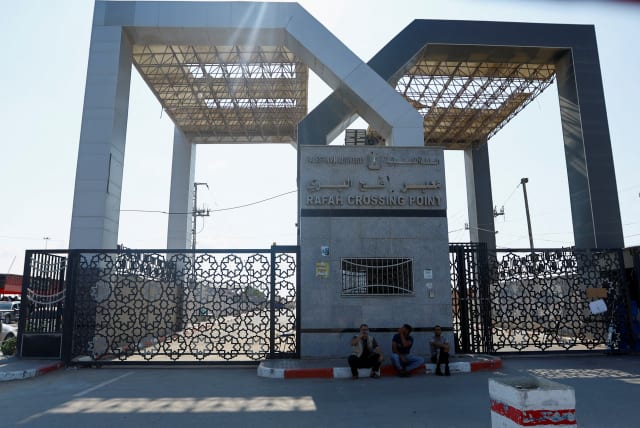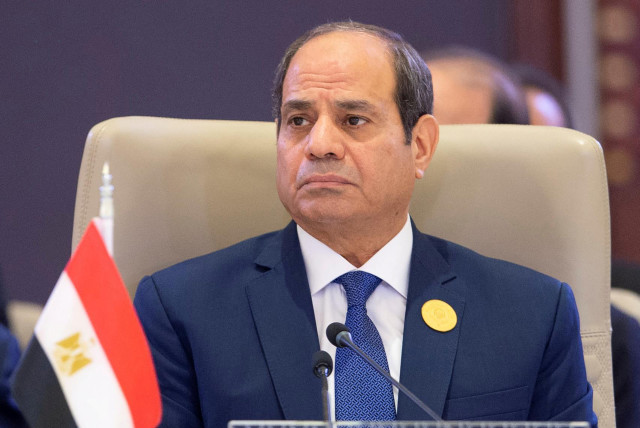Egypt becomes Arab world's 'bad guy' over Gaza's Rafah crossing - analysis

Videos have been circulating online of Gazans imploring Egyptian soldiers to let them pass, and reports of bribing Egyptian soldiers into letting Gazans out of the strip have begun to appear.
Spectators strolling these days through Cevdet Paşa boulevard in Istanbul will encounter unusual displays and loud demonstrations in front of the Egyptian consulate in the city. Some days it’s a faceless statue of bird in a cage; in others it’s a closed gate separating between medical equipment and food on one side – and corpses-shaped shrouds and artificially ventilated children on the other.
In all cases, two words will adorn the metaphorical “obstacles for freedom”: “Refah Kapısı”, Rafah gate. These displays and demonstrations are broadcast daily by Qatari Al-Jazeera and Turkish TRT, in an attempt to throw slime at Egypt and accuse the largest Arab country of surrendering to Israeli demands and not making sure that the Rafah border crossing is open to bring in aid and bring out the wounded from Gaza.
Noticeably, the Rafah border crossing plays an additional trump card for forces opposed to Egypt on the regional level, as Turkey, Qatar and Hamas are all allied as part of the Muslim Brotherhood axis, while Egypt outlawed the Brotherhood roughly one decade ago following the ousting of President Mohammed Morsi, the Muslim Brotherhood’s candidate, and in line with most of the eight decades of the history of the modern Arab Republic of Egypt, in which a secular, military leadership traditionally showed inherent disdain for the Muslim Brotherhood, its ideologies, its members and its political structure.
The situation at the Rafah border crossing
The Rafah border crossing is the only official point of access between Egypt and the Gaza strip. Located in the southern-central part of the roughly 14-kilometer-long border, it serves as a gateway between the namesake towns of Rafah on both sides of the border.
Photos from the past few days have shown tents of evacuees from the northern part of the Gaza strip essentially touching the fence in the new tent neighborhood of Gazan Rafah; while the Egyptian side also took measures to make sure no Gazans would make it past the border, building a series of mounds, fences and other fortifications between the two sides to keep away unwanted refugees.
The Gazan side of the crossing changed hands officially several times, from Israel to the Palestinian Authority to Hamas; sometimes also under European supervision and other times completely shut due to security issues; and always subject to changes as quadrilateral relations between Egypt, Hamas, the Palestinian Authority and Israel see ups and downs.
Although Egyptian president Abdul Fatah Al-Sisi claimed several days ago that 600 trucks of aid pass through the crossing daily, the crossing is nevertheless under constant scrutinization by Egypt’s adversaries, located at the epicenter of a global campaign to pressure Egypt, not Israel, into bringing in more aid and getting more Gazans out.
As of lately, videos have been circulating online of Gazans imploring Egyptian soldiers to let them pass, and reports of methods to bribe Egyptian soldiers into letting Gazans out of the strip began to appear.
And, indeed, an article published by Le Monde three days ago exposed a network of brokers and agencies who sell permits for exorbitant prices of thousands of dollars per person in order to exit the Gaza strip.
Some reports by critics of the Al-Sisi regime have made allegations that the Rafah crossing, as well as these other agencies, are run by Ibraheem Al- Argani, a prominent businessman and tribal leader in the Sinai peninsula, who also happens to be a close friend of Al-Sisi and presumably a member of the Egyptian intelligence services.
This indirectly implicates El-Sisi’s close circle of profiting from the plight of Gazans. Some relatives of Gazans even started GoFundMe campaigns to help their families leave the Gaza strip and make it to safety.
Some Gazans, however, seem to be lucky enough to exit the Strip through special invitations or contacts. The most prominent of those was Wael Al-Dahdouh, director of Al-Jazeera’s office in Gaza, who was flown to Doha a couple of weeks ago following years of reporting from Gaza for the Qatari mouthpiece and especially harsh hardships during the past war, including losing family members such as his son – also revealed by the IDF spokesman to be a militant from the Palestinian Islamic Jihad movement aligned with Iran.
Another influencer who made it past the gates all the way to Doha was Motaz Azaiza, a Gazan influencer and journalist who broadcasted from within Gaza during the war and gained a large following, showing the close relations of media personnel in Gaza with the same government who provides asylum and a safe haven for the leaders of the terror group Hamas in Doha.
Online campaign to pressure Egypt
The hardships at the crossing also brought with them a viral online campaign under the hashtag “Open the Rafah Crossing” in Arabic is currently underway.
This campaign apparently gained track when Osama Gaweesh, a UK-based journalist originally from Egypt and a hardline critic of the Al-Sisi regime, simply tweeted the hashtag earlier this month, later adding in another tweet: “as an Egyptian citizen, I apologize to all our people in Gaza.
Shortly after that, in mid-January, a rather spontaneous rally convened at the Egyptian Journalists’ Syndicate headquarters in Cairo, where protesters chanted “there’s a crossing between us and our families, the Zionist is controlling us”, “as long as Arab blood is cheap – let any president fall!” and “we want the crossing open!”
The campaign then spread virally with thousands of appearances over the past few weeks and a potential reach of millions of users across the Arab speaking sphere. A recent participant who joined this already trending campaign, and who may be deemed surprising, is no less than the BDS movement, more specifically their Arabic speaking outlets. While usually directed at Israel, the past days have seen an uptick in the movement’s attempts to apply pressure on the Egyptian government as well.
In one post, the movement accused that, while “The Israeli enemy places the responsibility for preventing the entry of aid into the Gaza Strip on Egypt… response from the Egyptian authorities is insufficient to deny the accusation of (Egyptian) participation in genocide,” wondering: “Does the ambiguity of the current situation between Egypt and Israel regarding the Rafah border crossing reflect their joint coordination, and therefore shared responsibility (for genocide)?”
Al-Sisi’s response and Gazans unconvinced
In an attempt to reduce pressure, Egyptian President Abdul Fatah Al-Sisi said in a speech he delivered last week that “If I were the reason for not bringing in a loaf of bread to Gaza – where would I run from my creator? The Rafah border crossing is open 24 hours a day, seven days a week… however, measures taken by the other side, by Israel, to allow us to bring in (aid) without anyone opposing it – that is the reason for this (problem)," he said.
"It’s a form of pressure (from Israel) on the Strip and its residents because of the conflict between them regarding the subject of the release of hostages," he continued, "Meaning, they use this as a means of pressure on the population."
This remark may refer to Israel’s addressing Egypt as the sole bearer of responsibility for the Rafah crossing during its response for South Africa’s complaint at the International Court of Justice, as Israel’s representative Christopher Staker replied to a measure calling Israel not to impede access to Gaza by fact finding missions and international bodies by stressing that “access to Gaza from Egypt is under the control of Egypt.”
However, not many Gazans were convinced by Al-Sisi’s statement, and continued insinuating that Egypt is an accomplice of Israel. One commenter wrote “Sisi claims that the Rafah crossing is open and was never closed during the war… may Allah curse you in this world and the next one. Filthy Zionist who loves lies and deception;” while another user responded: “this is a party who’s working for the benefit of the Mossad.”
Another user published a caricature by Yemeni caricaturist Kamal Sharaf showing a saddened Gazan child chained in his throat and two hands by shackles adorned with Israeli, Egyptian and Jordanian flags which impede him from reaching water and bread, as if to say that these three countries are complicit in starving Gazan children.
The user added “the Rafah crossing ill remain a curse which would hunt Al-Sisi… the Rafah crossing exposed Egypt and its role in the sieging of Gaza.”
Jerusalem Post Store
`; document.getElementById("linkPremium").innerHTML = cont; var divWithLink = document.getElementById("premium-link"); if (divWithLink !== null && divWithLink !== 'undefined') { divWithLink.style.border = "solid 1px #cb0f3e"; divWithLink.style.textAlign = "center"; divWithLink.style.marginBottom = "15px"; divWithLink.style.marginTop = "15px"; divWithLink.style.width = "100%"; divWithLink.style.backgroundColor = "#122952"; divWithLink.style.color = "#ffffff"; divWithLink.style.lineHeight = "1.5"; } } (function (v, i) { });

